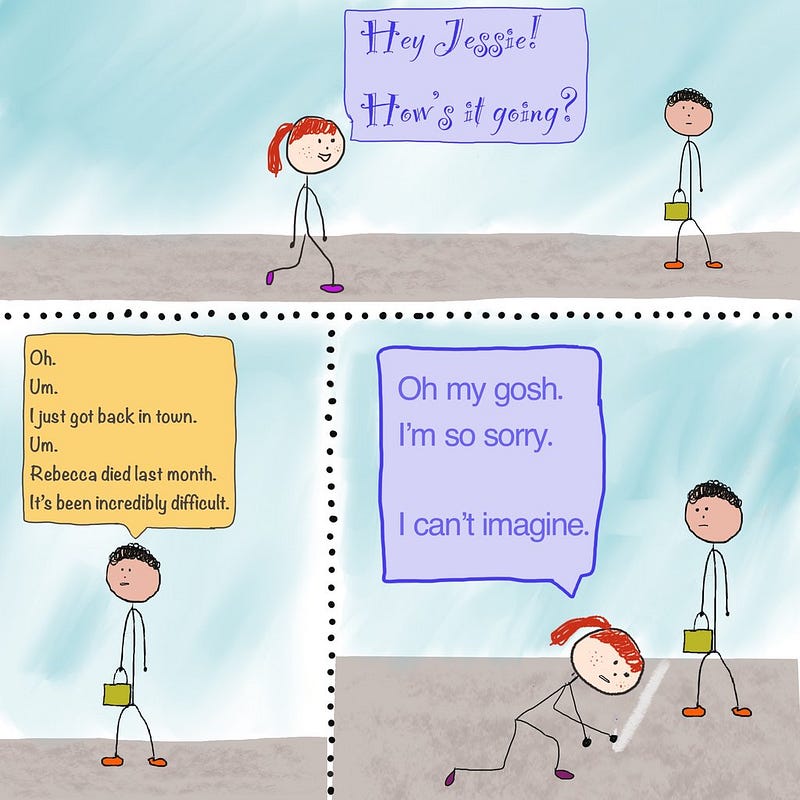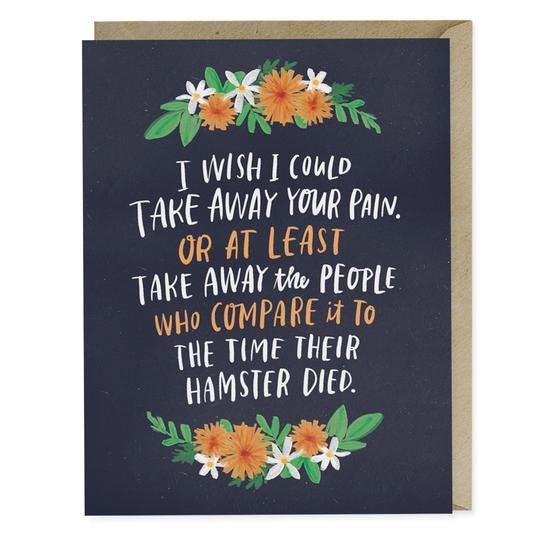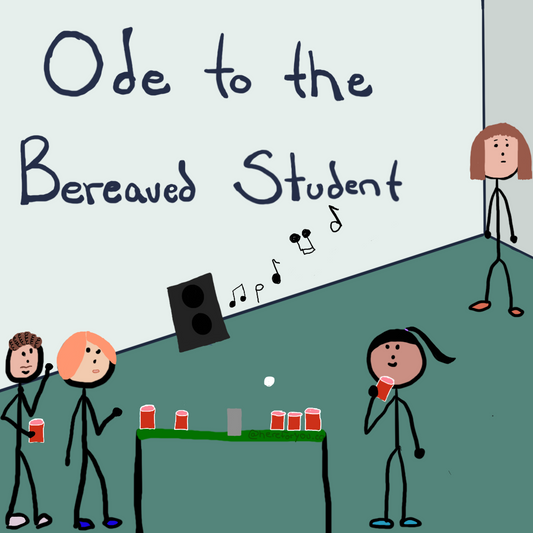Why we need to stop telling people that their pain is unimaginable
In the spring of 2017, my sister and her family moved from NYC to a suburb near where we grew up. She died exactly two months later. There are still boxes that haven’t been unpacked — her winter clothes, baby gear for a second child that she never had. It’s all marked and labeled in her handwriting. ‘Living Room’ with a picture of an elephant (she and her son drew in crayon on many of the boxes while they waited for moving day).
Her new town was part of the school district we attended as children. My sister knew all the tricks of the trade: the backroad shortcuts, the homes that had belonged to our old classmates, the cheapest gas station and the best place to get pizza. When she died, my brother-in-law had barely settled into this land of midcentury homes, windy roads, and frequent power outages (many seemingly benign weather events result in multi-day blackouts in this town). He didn’t have any connections.

So, I pleaded my case to the admins of his neighborhood Facebook group and was granted access on his behalf (my brother-in-law is not on social media). Once in, I relayed important neighborhood happenings — coyote sightings, car break-ins, complaints about noisy Saturday morning leaf blowers.
Soon after joining the group, I learned about a fundraising event for a local family whose son had been diagnosed with DIPG, an inoperable and terminal brainstem cancer. I read the updates that the parents posted as their son continued with his treatment. I mourned with the community when he died 18 months ago.
Because of all the people who can’t imagine, shouldn’t they be the ones who could?
Soon after his death, this boy’s mom wrote about how so many people met her during her son’s illness and death with “I can’t imagine.” She said that these words stung the most coming from other parents, mothers in particular. Because of all the people who can’t imagine, shouldn’t they be the ones who could?
When I read her words, I immediately connected with what she was saying. It is hard to know what to say when someone is grieving, and many of us will often turn to ‘I can’t imagine’ because we believe that it is sensitive and respectful to another’s experience. I know that I have probably used it dozens of times. We don’t want to step on any toes or pretend that we know what they’re going through. But ‘I can’t imagine’ is one the more frustrating platitudes I’ve heard since my sister’s death.
There is a difference in saying ‘I can’t imagine’ when someone has willingly signed up to do something. “I can’t imagine hiking the Appalachian Trail,” or “I can’t imagine completing a 5,000 piece monochromatic puzzle.” When asked how the trailblazer/puzzle master accomplished the task, they may shrug their shoulders and say, “I wanted to do it, so I just did it.” If people want to do something, they can pretty much always figure out a way to make it happen.

It is so hard, when you are in pain, to hear someone say that your experience is unimaginable. It’s not unimaginable because you are living it, and you never asked to live it. You have not chosen to get a call that your partner died in an accident. You did not choose for a doctor to tell you that your child is critically ill. You never signed up to have your sibling die by suicide.
It’s ok if you refuse to imagine completing a 5,000 piece monochromatic puzzle because this is not an accomplishment that needs to be done. I can appreciate the effort, be awed by the result, but I don’t need to bother imagining the hours and patience necessary to accomplish the task. But the story is different when someone’s life takes an unexpected turn that they never wanted for themselves. When a friend or relative is forced to live through a seemingly impossible reality. No matter the circumstances, they’re not beyond the realm of our imagination because for an adult with a fully formed brain who has experienced love, a child, or anyone dying, is not unimaginable.
When they say “I can’t imagine,” what they’re really saying is that that they refuse to use their emotional imagination. They’re scared to do it because your reality is not something they would ever wish for themselves. That same fear makes them scared of us. But we, the bereaved, can feel your fear and it doesn’t feel good. It feels isolating and lonely.
When the bereaved hear, ‘I can’t imagine,’ it’s like a line has been drawn in the sand separating us from them. That there is something tragically unique about those who are living with deep grief — the grief that comes with out-of-order or premature deaths. The grief that follows tragedy.

I think it’s ok to imagine someone else’s pain, and I think we’ll be better people, and have greater empathy if we do. If, instead of ‘I can’t imagine’, we try something like, “I know how much you loved your mom. I can imagine how painful it must be now that she’s not here.”
There is a big difference between ‘I can imagine’ and ‘I know.’
With that said, there is a critically important caveat. Regardless of what we have experienced, we should never say, ‘I know how you feel.’ There is a big difference between ‘I can imagine’ and ‘I know.’ We can never know exactly how anyone feels, and saying so can belittle or magnify another’s experience. It’s also the opposite of validation and when you’re grieving you crave validation.

In the many private Facebook bereavement groups I belong to (which, among other things, serve as a safe space to release angrief), it’s very common for people to rant when well-intentioned supporters stake claim to their pain. They’ll share stories about the time someone said, “I know exactly how you feel. My grandma died when I was 15 and we were very close. She was like a mother to me.” Or, “My dad died too. He was 96. I know exactly what you’re going through.”
Every grief experience is nuanced and unique because every person and relationship is nuanced and unique.
But no one can ever know exactly what it’s like. Not two people with the same losses. Not two people in the same family. Parents will grieve their child differently. A mother and a son will grieve for their husband/dad differently. Two friends will grieve for their classmate differently. Every grief experience is nuanced and unique because every person and relationship is nuanced and unique.
I am not trying to say that it’s constructive to constantly worry about who will die next and spend all your time thinking about what it will be like when they do. Someone will die next, of course, but worrying about it unnecessarily is not a good space to live in (I know…I’ve done it for most of my life 😳).
I am suggesting that we take time to empathize with a friend in great pain because it can help us be a stronger source of support. Your relationship may grow because of it. Because you will imagine how hard the social media ‘holiday’ Daughters Day will be for a woman who lost her child (BTW — what’s up with all of these fake social media holidays?). And you will remember that every October your friend’s family would visit a pumpkin patch and take a picture near the corn maze and now that one of their children has died they must decide whether to keep tradition or skip it. That just because your friend has a new girlfriend and posted a photo of them clinking wine glasses with smiles, doesn’t mean that this replaces the longing and love for her deceased wife. This doesn’t mean that she got her happy ending.
Taking time to imagine someone you care about’s pain helps you gain the perspective to learn how to be supportive. You will know to keep space in the present for their person who lived in the past. You will better understand the depth and breadth of their loss. How all-encompassing and life-altering it is when someone we love deeply dies. How, when tragedy happens, the afflicted move forward while carrying great pain. There’s barely a choice. They learn as they go. They just do it.
Genuine grief support for a good friend means you’re there for the long haul.
And so if you find yourself loving someone who is bereaved, imagine their pain and move forward with patience and love. Genuine grief support for a good friend means you’re there for the long haul. It’s part of a selfless love that we all hope to give and receive. This type of love is not easy, but it can make you a better person and your friend or family member will be so thankful for your support (even if they never tell you).
And, eventually, when you need this kind of love, they may be one of the few special ones who show up for you.
____
Here For You offers fully customizable care packages for family and friends living through life's toughest transitions. Our practical gifts range from curated household essentials to customizable sets of self-care items, all prepared with a personal touch.



4 comments
Thank you.
I’ve noticed lately that I’m using this phrase quite excessively and this article has explained why it’s been feeling… off? It is a decision to not enter the emotional realm with the person in question, it stops true connection like a verbal air hug. Either hug them or don’t. Thank you, truly. Kindness to you & yours.
I prefer to go with “I can only imagine” because it says that we are there sharing your feelings as best as we can, but that we can only go so far in fully understanding those feelings.
This entire site has been very helpful for me to understand and overcome my own grief. thank you
Absolutely perfectly expressed.
Superb!!